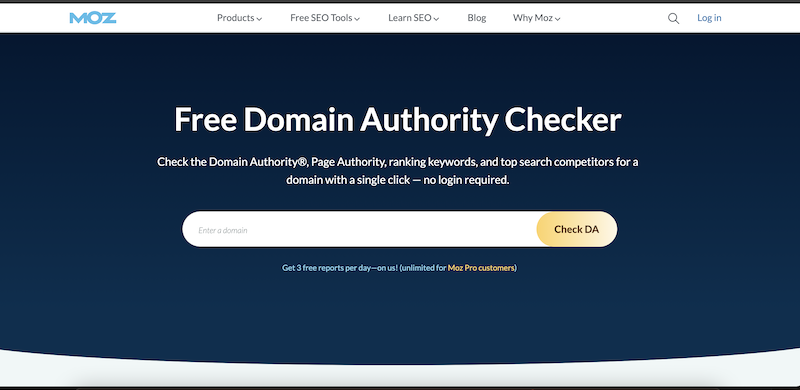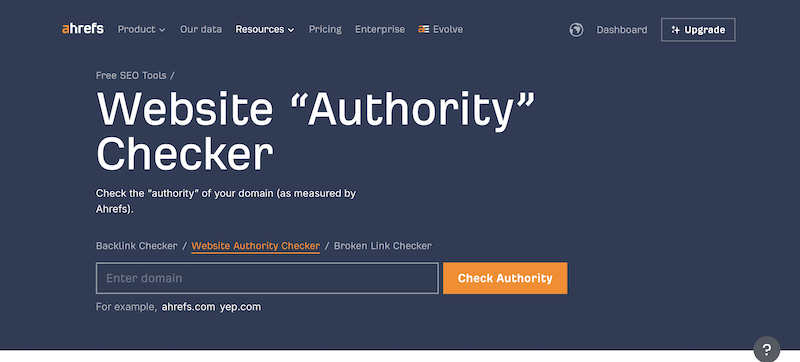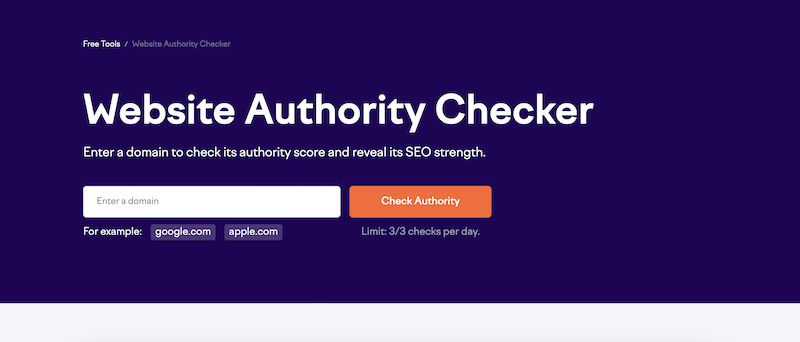What is a Good Domain Authority for My Website?
Is a Domain Authority of 50 better than a 30? Is a 50 good enough to compete in my industry? These are questions that many business owners and marketers grapple with. You've likely heard the term "Domain Authority" thrown around a lot in the world of SEO, often implying that a higher score is the ultimate goal. But what does that number mean for your website?
In this guide, we'll examine this popular metric. We'll explain what a "good" Domain Authority (DA) truly is, why it's a comparative tool rather than a direct ranking factor for Google, and how you can strategically improve it. Our goal is to move beyond the numbers and provide you with a clear, actionable understanding of what a robust online presence entails.
First, let's get a few things straight: Domain Authority, as a metric, was created by Moz. While it's widely used and highly respected, it is not something Google's algorithm uses to rank your site. It's an independent, third-party score designed to help you benchmark your site against competitors. It's a key indicator of your website's potential to rank well, but it's not the final word.
A statistic from Moz highlights this perfectly: the median Domain Authority for small to medium-sized businesses is around 19. If you're a smaller business with a DA of 30, you're already performing better than half of your competitors in that category, and that's a significant achievement.
The Three Faces of Authority: DA vs. DR vs. AS
When we talk about "website authority," it's easy to get confused because multiple tools measure it. While they aim to give you a similar picture, they each use a different formula. The three most common are:
-
Moz's Domain Authority
-
Ahrefs' Domain Rating
-
Semrush's Authority Score
Understanding the differences is crucial to interpreting your numbers correctly.
Domain Authority (DA) by Moz
Moz's DA is the original metric. A predictive score, ranging from 1 to 100, estimates how likely your website is to rank in search engine results pages (SERPs). The calculation behind it is complex. Moz's algorithm considers numerous factors, including the number of unique linking root domains, the total number of backlinks, and the quality and relevance of those links. It is a comprehensive metric that provides a broad view of your site's health and its relationship with the rest of the web. Moz's algorithm mimics Google's ranking factors, but it's an educated guess, not a mirror image.
Domain Rating (DR) by Ahrefs
Ahrefs' Domain Rating (DR) is different because it is laser-focused on one primary factor: your backlink profile. On a scale of 0 to 100, DR measures the strength and quantity of backlinks pointing to your website. It's a powerful metric for understanding the robustness of your link-building efforts. A high DR score indicates that your website has a robust backlink profile, a significant indicator of credibility. However, it doesn't take into account other on-page SEO factors. This singular focus is what distinguishes it from DA.
Authority Score (AS) by Semrush
Semrush's Authority Score (AS) also measures a website's authority on a scale of 0 to 100, but with a unique twist. Its algorithm uses AI and machine learning to evaluate backlink profiles, focusing on the quality of links and their traffic potential. Its " spam score " sets AS apart, helping you differentiate between a website with a genuinely strong profile and an artificially inflated one. This metric is designed to be more challenging to manipulate, providing a nuanced view of your website's backlink health.
Because each tool has its proprietary algorithm and dataset, the same website can have wildly different scores. For example, a well-known site like Backlinko has an:
-
Authority Score of 62 in Semrush
-
Domain Rating of 90 in Ahrefs
-
Domain Authority of 74 in Moz.
This is why you should never treat these numbers as an absolute truth. They are best used as comparative tools to track your progress and benchmark your site against your direct competitors. The goal isn't to get a perfect 100—it's to be the most authoritative site in your niche.
What's a "Good" Score? Finding Your Benchmark
So, with all these different metrics, how do you know what a "good" score actually is? The simple answer is that it's relative. A good DA for a local bakery differs completely from a good DA for a national news outlet. The most effective way to set your goals is to look at the scores of your competitors.
Here's a general breakdown to help you understand where you stand:
-
DA 0-20: This is a common starting point for new websites. Improving your score in this range is relatively easy, and you'll see big jumps in your numbers with foundational SEO work and initial link-building.
-
DA 20-40: Websites in this range are established and have some level of authority. This is a common sweet spot for many small and mid-sized businesses. It's where you can compete for less complicated keywords and build a solid foundation.
-
DA 40-60: A website with a score in this range is considered strong and reputable. You have a significant online presence and can compete for more competitive keywords. For context, our own site, Aspiration Marketing, has a DA in the 50s and is constantly climbing. This allows us to compete for valuable industry keywords and establish our expertise.
-
DA 60+: These are excellent, high-authority domains. Think major publications, universities, and large brands. Getting a DA score in this range is a significant challenge and requires a long-term, sustained SEO effort.
The key takeaway? A good DA is higher than your competitors. Use these metrics as a guide to set realistic goals. If your top competitor has a DA of 35, aiming for a DA of 40 is a meaningful and achievable goal. It gives you a clear target to work towards.
The Engine of Authority: Core Driving Elements
The numbers aren't the goal; they result from your hard work. Domain Authority and Domain Rating are direct reflections of your SEO strategy. So, what are the core elements that truly drive a higher score?
-
Backlinks: The Foundation of Authority. Backlinks are king when it comes to building authority. A backlink is simply a link from another website to yours. Search engines see these links as "votes of confidence." The more votes you have from reputable sources, the more trustworthy and authoritative your website appears.
-
Quantity and Quality: It's a common misconception that more links are always better. In reality, the quality of the links matters more than the quantity. A single backlink from a major industry publication or news site is far more valuable than a hundred links from low-quality, spammy blogs. Ahrefs found that 90% of websites get no organic search traffic because they have no backlinks, which highlights just how crucial they are.
-
Referring Domains: Another critical factor is the number of unique domains linking to you. If a single website links to you 20 times, it's still just one referring domain. Having 20 different websites, each of which links to you once, is far more impactful for your authority score. This diversity shows that your site is widely recognized as a valuable resource.
-
On-Page SEO and Quality Content. While backlinks are the engine of authority, high-quality content is the fuel. You can't earn excellent links without something worth linking to. Websites consistently publishing unique, informative, and well-researched content are more likely to attract natural backlinks.
This content isn't just for search engines; it's for people. By creating in-depth guides, original research, or helpful resources, you position yourself as an expert and give other websites a reason to reference you.
-
Site Structure: How you organize your content also plays a role. A logical internal linking strategy—connecting your pages with relevant links—helps search engines understand your site's hierarchy and distributes link equity. A well-structured site is also easier for users to navigate, which leads to a better experience.
-
User Experience (UX) Search engines prioritize websites that offer a great user experience. While these factors may not directly calculate your DA or DR, they have a powerful indirect effect.
-
Mobile-Friendliness and Page Speed: Most internet traffic now comes from mobile devices. If your website is slow or difficult to use on the phone, users will bounce, signaling to search engines that your site isn't a good resource. A fast, mobile-friendly site keeps users engaged, leading to more extended visits and, in turn, a higher likelihood of earning backlinks and improved rankings.
How to Boost Your Authority: Actionable Steps
Ready to start climbing? Here's a checklist of actionable steps to build a more authoritative website.
1. Create Linkable Assets.
Your content must be so compelling that others feel compelled to link to it. Instead of writing a generic blog post, create resources that stand out.
-
Conduct Original Research: Gather your own data and publish the findings. Other sites in your industry will naturally link to you as a source.
-
Write Comprehensive Guides: Create an ultimate guide on a specific topic that is more in-depth than anything else on the web.
-
Develop Infographics or Visualizations: Present complex data in an easy-to-understand, highly shareable visual format on social media and other websites.
2. Implement a Proactive Link-Building Strategy.
You can't just wait for links to come to you. You have to actively earn them.
-
Guest Blogging: Write high-quality content for other relevant, authoritative sites in your industry. This earns you a valuable backlink in your byline and exposes your brand to a new audience.
-
Broken Link Building: Use a tool to find broken links on other websites in your niche. Then, create content that can serve as a replacement and contact the site owner. This mutually beneficial tactic earns you a link while helping the other site fix a broken page.
-
Digital PR: Develop a strategy to get your brand mentioned in online news outlets and publications. Securing a link from a primary news site can dramatically impact your authority.
3. Optimize Your On-Page SEO and Content
Even the best content can fail if it's not properly optimized.
-
Content Audits: Regularly review and update your old content. Freshen up statistics, add new information, and improve the overall quality to keep it relevant.
-
Internal Linking: As you create new content, link it back to relevant, existing pages on your site. This builds a strong web of internal links that helps users and search engines navigate your site more effectively.
4. Focus on Technical SEO and User Experience
A technically sound website provides a solid foundation for all your other efforts.
-
Improve Site Speed: Use tools like Google PageSpeed Insights to identify and fix slow-loading pages. A faster site leads to a better user experience and can indirectly boost your rankings.
-
Ensure Mobile Responsiveness: Verify that your website is fully functional and easily readable on any device.
Beyond the Numbers
Ultimately, a good Domain Authority score isn't a prize to be won; it's an indicator of your website's overall health and the effectiveness of your SEO strategy. While it's a valuable tool for benchmarking and goal-setting, the real work is in creating great content, earning quality backlinks, and ensuring your website provides an outstanding user experience.
The ultimate goal isn't just to have a higher number, but to build a website that is a proper authority in its niche. This trusted, reliable site consistently provides value to its visitors. And that's precisely the kind of holistic approach we take.
At Aspiration Marketing, we understand that building actual authority requires a comprehensive strategy that combines technical excellence with high-quality content and robust link-building, all while keeping the user at the forefront.
This content is also available in:
- Deutsch: Was ist eine gute Domain Authority für meine Website?
- Español: ¿Qué es una buena autoridad de dominio para mi sitio web?
- Français: Qu'est-ce qu'une bonne autorité de domaine pour mon site web ?
- Italiano: Che cos'è una buona autorità di dominio per il mio sito web?
- Română: Ce este o autoritate de domeniu bună pentru site-ul meu?
- 简体中文: 对我的网站而言,什么是良好的域名授权?

Joachim is a certified HubSpot trainer with over 13 years of experience in content marketing, strategy, website development, and SEO. He has implemented numerous large-scale, international growth marketing programs, including one with UiPath, which grew from a startup to a successful IPO on the NYSE. Joachim has special expertise in multilingual marketing and sales enablement projects, and he uses the latest AI technologies to help our clients.











Leave a Comment